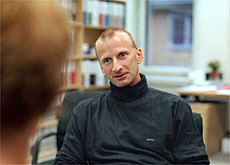Psychiatrist says therapy works for some offenders

A senior Zurich psychiatrist believes many violent criminals and sex offenders can be treated successfully.
But, according to Dr Frank Urbaniok, there are up to 50 prisoners in Switzerland who can never be released because they are too dangerous.
Urbaniok heads the psychiatric and psychology unit attached to canton Zurich’s courts. The unit sees around 1,300 patients a year, including nearly 200 sex offenders – a third of whom are not behind bars.
Some have been released from prison; others never received a custodial sentence. Yet Urbaniok says he has had only one case of a patient re-offending in seven years.
Urbaniok’s methods have been receiving increased attention because of Sunday’s nationwide vote on whether dangerous criminals and sex offenders, who are untreatable, should be imprisoned for life.
The initiative was launched following several cases in which offenders committed further crimes after their release from prison. In one case, a man who had been let out of jail on weekend leave murdered a young woman.
“There are between 30 and 50 people in Switzerland who cannot be released,” Urbaniok told swissinfo. “The risk for the public is simply too great.”
But while he acknowledges that it is very important to identify this type of offender, Urbaniok maintains that this is not a difficult task for psychiatrists.
“In that sense the initiative is unnecessary,” he said, “because the people who are untreatable will not be released anyway.”
Confronting the crime
The key to Urbaniok’s methods lies in forcing the offender to confront his crime.
“In each treatment the main focus is the crime,” he explained. “It is an offence-oriented approach.”
“We offer them a very intensive therapy programme. We work in group sessions and each patient attends for up to 14 hours a week.”
Unlike more traditional forms of therapy, Urbaniok and his team do not spend much time looking into the early childhood of the offender. Instead, the precise details of the crime itself are re-examined in detail.
“You have to think of it as a bit like slow motion in a soccer game,” he said. “We go into the crime scene by scene. It is very graphic.”
Urbaniok says part of the reason for this approach is the hope that the offender will learn to empathise with the victim. However, the primary goal is to have the offender learn what his risk signs are.
“The idea is that an offender who becomes very familiar with his behaviour can control it.”
Crime prevention
Urbaniok insists that therapy can reduce the risk that sex offenders will repeat their crimes.
“99 per cent of all people imprisoned will be released at one time or another,” he pointed out. “So our strategy is all about long-term risk management.”
Urbaniok uses the example of a paedophile to demonstrate how the therapy works. By carefully examining his crime, the individual can identify the behavioural patterns and the situations which led to his offence, and try to avoid them.
“A paedophile, like an alcoholic, can learn to be abstinent,” said Urbaniok.
Intervention
His team also assess patients for possible signs that they may be about to re-offend. Unlike most doctor-patient relationships, this one is not confidential.
“We have what we call a therapeutic contract with our patients,” explained the psychiatrist.
“We explain to the patients that we can give some information to the authorities and that there are cases in which we would intervene.”
One of the most important aspects of the therapy, says Urbaniok, is that it is very long term.
“Many of our patients have severe problems and a long history of offending. So they may need us for five or even ten years. It’s important that they can turn to us years and years later if they need to,” he said.
So far, Urbaniok’s methods have had very good results. “But these statistics are actually too good,” he said. “It certainly won’t stay as low as that.”
A precise analysis of how well the therapy works is expected by the end of this year.
swissinfo, Imogen Foulkes
Canton Zurich offers intense crime-oriented therapy for sex offenders.
The aim is to force offenders to recognize their behaviour patterns, and thus prevent them re-offending.
The success rate of the therapy seems good so far, but official statistics are not yet available.
Psychiatrists estimate there are between 30 and 50 violent offenders in Switzerland who are untreatable, and therefore should never be released from gaol.

In compliance with the JTI standards
More: SWI swissinfo.ch certified by the Journalism Trust Initiative

You can find an overview of ongoing debates with our journalists here. Please join us!
If you want to start a conversation about a topic raised in this article or want to report factual errors, email us at english@swissinfo.ch.